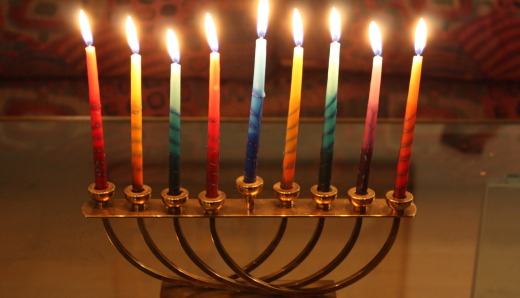
A familiar saying at this time of year has it that when all the Jews spell Hanukkah the same way, Deliverance will truly have come! (Other variants include Hanukah, Chanukah, Hanuka, Khanuka, Khanike, and more.)
The joke is telling because like most things, the holiday can be viewed from multiple perspectives. For many years Jews considered it a minor holiday, observed with small gifts for the children and the lighting of candles on a menorah each of the eight nights of the season. It is no coincidence that Hanukkah is called the “Festival of Lights.”
There’s no mystery in understanding why Jews, and perhaps most peoples, celebrate a holiday of light at the time of the winter solstice. The Yule log, the Christmas lights, the evergreen, the Kwanzaa candelabrum, are all cheerful reminders of hope and promise in the cycle of rebirth that will return in the spring with the New Year. When Americans wish one another a generalized “Happy Holidays,” we express a sincere universality of shared warmth amidst our collective cold.
Hanukkah is the only Jewish holiday (until modern times) with verifiable historical roots. It commemorates the revolt of the Maccabees in 167-164 BCE (Before the Common Era, as Jews prefer to say), against the Greek occupation of Jerusalem and Palestine. The Greeks had imposed the rule of law, philosophy, religion, debate and governance at odds with traditional Jewish practice. The Maccabean rebellion was directed as much against Greek hegemony as against fellow Jews they accused of becoming overly “Hellenized,” giving up circumcision, for example, eating pork or engaging in nude sporting matches.
Although celebrated for having conducted the first successful documented revolution for “national liberation” and religious freedom, the Maccabees are also disparaged by history for having established a corrupt dynasty of priestly kings, a theocratic mixing of “church and state.” Later rabbinical authorities looked back on this disastrous period and invented the charming story of the miracle of the vial of oil that lasted for eight days, trying to convert the significance of the holiday into one of awe of God and his wonders, rather than military victory.
Incidentally, the Hanukkah story inspired the American colonists in their struggle against King George III. How could people so profoundly influenced by Christian theology oppose the divine right of kings? Well, just look at the First Book of Maccabees and there you have it: “Resistance to tyranny is obedience to God.” And from that principle, how many people of faith, and entire movements for civil rights and freedom, have taken a potent lesson! (Needless to say, right-wing ideologues also cite such passages – one of the dangers of relying on Biblical literalism.)
In modern times, defenders of the West Bank occupation cite the Maccabean spirit as an expression of the militarist solution to Israel’s survival. Curiously, those who most loudly insist on the definition of Israel as a “Jewish state” thus fly directly in the face of the many later generations of rabbis who emphasized that well-known passage in Zechariah 4:6 that warns us, “Not by might, nor by power, but by my spirit, saith the Lord of hosts.”
So the controversy over the essential meaning of Hanukkah continues and perhaps can never be pinned down definitively. Perhaps it’s best left as a joyous holiday for children that brings the Jewish component to the bountiful table of multiculturalism as we anticipate the return of sunny days.
Photo: http://www.flickr.com/photos/scazon/ / CC BY 2.0
This article originally appeared on PeoplesWorld.org Dec.14, 2009.
Related Articles
- Populism, MAGA, and Christian nationalism’s racist roots
- Kendrick Lamar’s halftime show and Black cultural resistance
- Black youth resistance highlighted at CT People’s World event
- Telling our stories: breaking out of capitalism’s cultural chains
- Communist Portuguese festival gathers thousands in Lisbon


 Join Now
Join Now